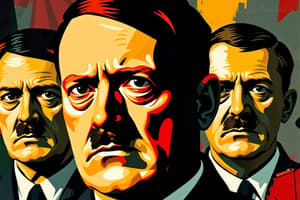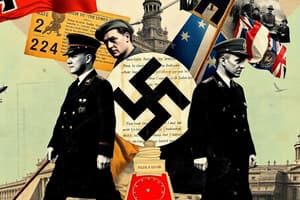Podcast
Questions and Answers
What event marked Mussolini's first major act of aggression in the 1930s?
What event marked Mussolini's first major act of aggression in the 1930s?
- The invasion of France
- The invasion of Ethiopia (Abyssinia) (correct)
- The invasion of Poland
- The annexation of Austria
Which of the following actions did Hitler take to undermine the Treaty of Versailles and rebuild Germany's military might?
Which of the following actions did Hitler take to undermine the Treaty of Versailles and rebuild Germany's military might?
- Establishing the Luftwaffe (German air force)
- Introducing conscription and expanding the army
- Remilitarizing the Rhineland, a demilitarized zone
- All of the above (correct)
Which international organization was intended to maintain global peace through collective security, but ultimately failed to prevent the aggression of dictators like Mussolini and Hitler?
Which international organization was intended to maintain global peace through collective security, but ultimately failed to prevent the aggression of dictators like Mussolini and Hitler?
- The North Atlantic Treaty Organization (NATO)
- The United Nations
- The Warsaw Pact
- The League of Nations (correct)
What was the primary response of democratic nations to the aggressive actions of dictators like Mussolini and Hitler in the 1930s?
What was the primary response of democratic nations to the aggressive actions of dictators like Mussolini and Hitler in the 1930s?
Which of the following was NOT an act of aggression by Hitler in the 1930s that violated international agreements and threatened peace in Europe?
Which of the following was NOT an act of aggression by Hitler in the 1930s that violated international agreements and threatened peace in Europe?
What was the primary factor that contributed to the failure of the League of Nations in preventing the aggressive actions of dictators like Mussolini and Hitler?
What was the primary factor that contributed to the failure of the League of Nations in preventing the aggressive actions of dictators like Mussolini and Hitler?
Which of the following accurately describes the policy of appeasement adopted by Britain and France?
Which of the following accurately describes the policy of appeasement adopted by Britain and France?
What was the primary driving force behind the policy of appeasement adopted by Britain and France?
What was the primary driving force behind the policy of appeasement adopted by Britain and France?
How did the League of Nations, established to guarantee collective security, perform in the 1930s?
How did the League of Nations, established to guarantee collective security, perform in the 1930s?
Which of the following best describes the Neutrality Acts passed by the United States Congress in the 1930s?
Which of the following best describes the Neutrality Acts passed by the United States Congress in the 1930s?
Which of the following factors contributed to the breakdown of international order and set the stage for World War II?
Which of the following factors contributed to the breakdown of international order and set the stage for World War II?
Which of the following statements accurately describes the isolationist approach advocated by some in the United States during the 1930s?
Which of the following statements accurately describes the isolationist approach advocated by some in the United States during the 1930s?
Study Notes
Challenges to Peace in the 1930s: Aggressive Actions by Dictators, Policies of Democacies, Verbal Protests, and Leaders' Reactions
Introduction
The 1930s was a turbulent decade marked by escalating aggression from authoritarian leaders and the resulting challenges to global peace. Events such as the rise of dictators like Adolf Hitler in Germany and Benito Mussolini in Italy, along with the breakdown of the League of Nations' collective security system, contributed to the increasing tension and eventual outbreak of World War II. This article explores the subtopics of aggressive actions by dictators, policies of democracies, verbal protests from democracies, Mussolini's aggression, and Hitler's aggression during this period.
Aggressive Actions by Dictators: Mussolini and Hitler
In the 1930s, fascist regimes led by Benito Mussolini in Italy and Adolf Hitler in Germany began to challenge international peace through acts of aggression. Mussolini, who came to power in 1922, pursued expansionist policies that included the invasion of Ethiopia (then known as Abyssinia) in 1935. Meanwhile, Hitler, who became Chancellor of Germany in 1933, also sought territorial gains for his nation. He rebuilt the German military and violated the Treaty of Versailles, which had restricted Germany's armed forces after World War I. These actions undermined the principles of collective security established after World War I and threatened the peace of Europe.
Policies of Democracies: Appeasement and Collective Security
The democracies of Britain and France attempted to maintain peace through a policy known as appeasement, which involved conceding to the demands of potentially hostile nations in hopes of avoiding conflict. This strategy was largely driven by the desire to avoid another major war. However, it proved to be a failure when, despite Britain and France's reluctance to plan for war, Hitler broke the Munich agreement and annexed Czechoslovakia just months later. The League of Nations, established to guarantee collective security, also experienced significant failures in the 1930s, unable to protect its members against aggressive policies.
Verbal Protests from Democracies: Neutrality Acts
As the situation in Europe worsened, democracies like the United States faced internal debates over their role in maintaining global peace. Isolationists advocated non-interventionism, citing the memory of U.S. involvement in World War I and the economic challenges posed by the Great Depression. In response, Congress passed a series of laws known as the Neutrality Acts, which aimed to prevent the United States from becoming involved in foreign conflicts. Despite these efforts, the isolationist approach ultimately failed to prevent U.S. entry into World War II.
Conclusion
The challenges to peace during the 1930s were rooted in the aggressive actions of dictators like Mussolini and Hitler, the misguided policies of democracies, and the inability of collective security measures to effectively deter or respond to acts of aggression. These factors contributed to the breakdown of international order and set the stage for the devastating events unfolding in the years leading up to World War II.
Studying That Suits You
Use AI to generate personalized quizzes and flashcards to suit your learning preferences.
Description
Explore the aggressive actions of dictators like Mussolini and Hitler, the policies of democracies including appeasement and neutrality acts, and the breakdown of global peace in the 1930s. Learn about the challenges that led to the outbreak of World War II.




